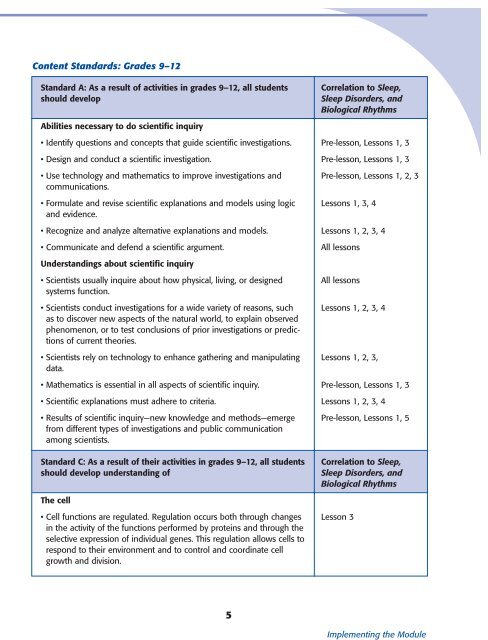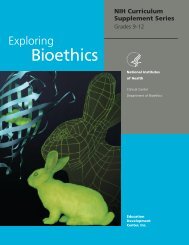Biological - NIH Office of Science Education - National Institutes of ...
Biological - NIH Office of Science Education - National Institutes of ...
Biological - NIH Office of Science Education - National Institutes of ...
Create successful ePaper yourself
Turn your PDF publications into a flip-book with our unique Google optimized e-Paper software.
Content Standards: Grades 9–12<br />
Standard A: As a result <strong>of</strong> activities in grades 9–12, all students<br />
should develop<br />
Correlation to Sleep,<br />
Sleep Disorders, and<br />
<strong>Biological</strong> Rhythms<br />
Abilities necessary to do scientific inquiry<br />
• Identify questions and concepts that guide scientific investigations.<br />
• Design and conduct a scientific investigation.<br />
• Use technology and mathematics to improve investigations and<br />
communications.<br />
• Formulate and revise scientific explanations and models using logic<br />
and evidence.<br />
• Recognize and analyze alternative explanations and models.<br />
• Communicate and defend a scientific argument.<br />
Pre-lesson, Lessons 1, 3<br />
Pre-lesson, Lessons 1, 3<br />
Pre-lesson, Lessons 1, 2, 3<br />
Lessons 1, 3, 4<br />
Lessons 1, 2, 3, 4<br />
All lessons<br />
Understandings about scientific inquiry<br />
• Scientists usually inquire about how physical, living, or designed<br />
systems function.<br />
• Scientists conduct investigations for a wide variety <strong>of</strong> reasons, such<br />
as to discover new aspects <strong>of</strong> the natural world, to explain observed<br />
phenomenon, or to test conclusions <strong>of</strong> prior investigations or predictions<br />
<strong>of</strong> current theories.<br />
• Scientists rely on technology to enhance gathering and manipulating<br />
data.<br />
• Mathematics is essential in all aspects <strong>of</strong> scientific inquiry.<br />
• Scientific explanations must adhere to criteria.<br />
• Results <strong>of</strong> scientific inquiry—new knowledge and methods—emerge<br />
from different types <strong>of</strong> investigations and public communication<br />
among scientists.<br />
Standard C: As a result <strong>of</strong> their activities in grades 9–12, all students<br />
should develop understanding <strong>of</strong><br />
All lessons<br />
Lessons 1, 2, 3, 4<br />
Lessons 1, 2, 3,<br />
Pre-lesson, Lessons 1, 3<br />
Lessons 1, 2, 3, 4<br />
Pre-lesson, Lessons 1, 5<br />
Correlation to Sleep,<br />
Sleep Disorders, and<br />
<strong>Biological</strong> Rhythms<br />
The cell<br />
• Cell functions are regulated. Regulation occurs both through changes<br />
in the activity <strong>of</strong> the functions performed by proteins and through the<br />
selective expression <strong>of</strong> individual genes. This regulation allows cells to<br />
respond to their environment and to control and coordinate cell<br />
growth and division.<br />
Lesson 3<br />
5<br />
Implementing the Module

















